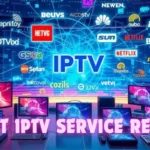
Introduction to Global IPTV
In the digital era, television is no longer confined to satellite dishes, cable boxes, or fixed schedules. Global IPTV—short for Internet Protocol Television—has become the game-changer in entertainment. By transmitting TV content over the internet instead of through traditional terrestrial or satellite signals, IPTV allows viewers worldwide to access their favourite channels, movies, and shows on demand from virtually any device.
With billions of people now connected to high-speed internet, IPTV is quickly replacing conventional television as the preferred choice for both casual viewers and dedicated binge-watchers.
What is IPTV and How Does It Work?
At its core, IPTV uses your internet connection to deliver television programming. Instead of broadcasting content via radio waves or fibre-optic cables, IPTV streams data directly to your device. This is made possible through advanced streaming protocols that ensure smooth playback, even across long distances.
A typical IPTV setup involves:
- An internet connection (usually broadband or fibre)
- A compatible device (Smart TV, computer, tablet, or smartphone)
- An IPTV app or service subscription
The Difference Between IPTV and Traditional TV Broadcasting
Traditional TV is delivered in real-time via cable or satellite infrastructure, and viewers have little control over when to watch. IPTV, however, offers:
- On-demand access to content anytime
- Interactive features like pause, rewind, or instant replay
- Content variety beyond regional limits
The Rise of Global IPTV in 2025
The demand for IPTV has skyrocketed thanks to improvements in broadband infrastructure and the affordability of streaming devices. According to industry reports, global IPTV subscriptions are expected to surpass 200 million households by the end of 2025.
Market Growth and Adoption Rates
The global IPTV industry has seen exponential growth over the past decade, driven by the rapid expansion of high-speed internet and affordable streaming hardware. From only a few million subscribers in the early 2010s, the industry is projected to generate over $120 billion in revenue by 2025. This growth is fueled by:
- Cord-cutting trends among younger audiences
- Affordable subscription plans compared to cable TV
- Global accessibility without geographical restrictions
Key Regions Leading IPTV Expansion
While IPTV is popular worldwide, certain regions stand out:
- Europe – Countries like France, the UK, and Spain lead in IPTV penetration rates.
- Asia-Pacific – China, South Korea, and India are seeing explosive adoption due to low-cost internet.
- North America – The U.S. and Canada are strong markets, especially for sports IPTV channels.
- Middle East & Africa – Rising smartphone penetration is driving mobile IPTV usage.
Popular Global IPTV Service Providers
Some of the most recognized IPTV services include:
- Netflix and Amazon Prime Video (though technically OTT, many integrate IPTV elements)
- Vivo TV, Sling TV, Hulu + Live TV, and IPTV Smarters
- Regional players like Zattoo (Europe) and Hotstar (India)
Types of IPTV Services
Live IPTV Streaming
Allows real-time viewing of TV channels over the internet, perfect for sports, news, and events.
Video on Demand (VOD)
Lets users choose and watch movies or shows anytime, without broadcast schedules.
Time-Shifted Media
Enables viewers to replay TV shows that aired earlier in the week, offering flexibility for busy schedules.
Benefits of Global IPTV for Viewers
Wide Range of Channels and Content
From local news to international movie channels, IPTV brings diverse entertainment options right to your screen.
Cost-Effectiveness and Flexibility
Most IPTV subscriptions cost significantly less than traditional cable packages while offering more channels.
Multi-Device Viewing Experience
You can start watching on your Smart TV, continue on your laptop, and finish on your smartphone—seamlessly.
Technical Requirements for Accessing IPTV
Internet Speed and Bandwidth Needs
A stable minimum speed of 10 Mbps is recommended for HD streaming, while 25 Mbps or higher is ideal for 4K content.
Compatible Devices and Applications
You can watch IPTV on Smart TVs, streaming sticks (Roku, Fire TV), smartphones, tablets, and PCs.
IPTV Middleware and Software Platforms
Many providers use platforms like Stalker Middleware or Xtream Codes to manage streaming and user access.
Legal and Licensing Considerations
Understanding Copyright Laws
Many countries have strict regulations regarding IPTV content distribution. Licensed providers obtain broadcasting rights legally.
Risks of Using Unlicensed IPTV Services
Illegal IPTV services often offer pirated channels, which can lead to:
- Legal penalties
- Malware infections
- Service shutdowns
How to Choose the Right Global IPTV Provider
Factors to Consider Before Subscribing
- Content library size
- Streaming quality (HD/4K)
- Device compatibility
- Trial periods
Comparing Pricing and Package Options
Providers offer monthly, quarterly, or yearly plans—compare to find the best value.
Customer Support and Service Reliability
24/7 support and minimal downtime are key for a great viewing experience.
Challenges Facing the Global IPTV Industry
Piracy and Copyright Infringement
Illegal IPTV services undermine the industry and hurt licensed providers.
Technical Issues and Buffering Problems
Poor internet connections or overloaded servers can cause interruptions.
Competition from Other Streaming Platforms
OTT services like Netflix and Disney+ compete for the same audiences.
Future Trends in Global IPTV
AI and Personalized Content Recommendations
Artificial intelligence will tailor viewing suggestions to match user preferences.
Integration with Smart Home Devices
Voice-controlled IPTV through assistants like Alexa or Google Home is becoming common.
Potential Impact of 5G Networks
5G promises ultra-fast speeds, eliminating buffering and improving mobile streaming quality.
FAQs About Global IPTV
Q1: Is IPTV legal worldwide?
Not always. IPTV is legal if the provider has the proper licenses. Unlicensed services may be illegal.
Q2: Can I use IPTV without a Smart TV?
Yes, you can watch IPTV on streaming sticks, smartphones, tablets, or even gaming consoles.
Q3: What is the main advantage of IPTV?
Flexibility—watching what you want, when you want, on any device.
Q4: Do I need a VPN for IPTV?
While not mandatory, a VPN can improve privacy and bypass geo-restrictions.
Q5: What internet speed is needed for IPTV?
At least 10 Mbps for HD and 25 Mbps for 4K is recommended.
Q6: Can IPTV replace cable TV completely?
Yes, many users have cut the cord entirely thanks to IPTV’s convenience and affordability.
Conclusion
Global IPTV has revolutionized the way we consume entertainment. Offering unmatched flexibility, affordability, and worldwide access, it is poised to dominate the future of television. However, choosing licensed providers and ensuring a strong internet connection are crucial for the best experience. With advancements in AI, 5G, and smart integration, IPTV’s role in our daily lives will only grow stronger.





